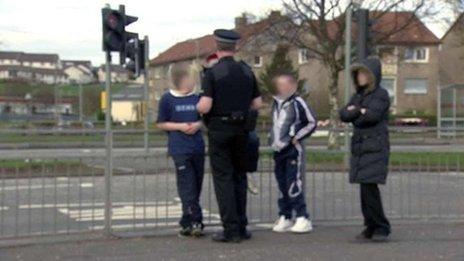Stop and searches 'four times more common in Scotland'
- Published

The figures found that young people aged between 15 and 20 were three times more likely to be stopped and searched
Police in Scotland carry out four times more stop and searches than their colleagues in England and Wales, according to a new report.
Research by Edinburgh University found there were 64 searches per 1,000 people in 2010, compared with 17 south of the border.
The figures also suggested that young people were the most likely to be searched.
Police Scotland has insisted that the policy helps reduce crime.
Figures released this week suggested that the number of stop and searches in Scotland had continued to rise over the last three years, to a rate of 131 searches per thousand people in 2013.
The Scottish Human Rights Commission has warned that such widespread use could cause long-term damage to community relations with the police.
The Edinburgh University study said most of the Scottish searches were "consensual" and did not require "reasonable suspicion".
That policy is not allowed in England, where officers must be able to demonstrate there was a reasonable suspicion for a search to take place.
Before Scotland's police forces were amalgamated, officers in Strathclyde were identified as the most likely force to use stop and search powers.
Despite having a 43% of Scotland's population and accounting for a 53% share of Scotland's drug and weapons offences, Strathclyde Police carried out 84% of stop searches.
The figure, at 372,900, was 10 times higher than the next nearest force, Lothian and Borders, which carried out 37,700 searches.
Verbal consent
The research also showed that Central Scotland Police conducted 39 searches per 1,000 people, compared to 30 in Lothian and Borders.
The authors of the report also highlighted the extensive use of non-statutory stop and search, which is premised on verbal consent rather than legislation.
In 2010, nearly three-quarters of searches in Scotland were carried out on this basis.
The report recommends that non-statutory stop and search should be phased out as they impact disproportionately on young people and lack important safeguards.
According to the figures, young people aged between 15 and 20 years were nearly three times more likely to be searched than those in their early 20s.
In 2010, approximately 500 children aged 10 years and under were also stopped and searched.
Approximately 80% of the searches carried out on under-10 year olds were non-statutory.
'Ideal position'
Report author Kath Murray, said: "While it is concerning that the use of stop and search has continued to increase under the single service, Police Scotland is now in an ideal position to make sure that stop and search is used fairly, consistently and on the basis of reasonable suspicion.
"Transparency and accountability are also essential to fair policing, which means that it's important to ensure that accurate and detailed data on stop and search is routinely published."
Professor Alan Miller, chairman of the Scottish Human Rights Commission said the increase in the use of stop and search where there was no reasonable suspicion was "particularly concerning".
He said: "Such an increased and extensive use of this form of stop and search power can, dependent upon the circumstances, be unlawful, be carried out without informed and freely given consent, and have a longer-term adverse impact upon police and community relations.
"Scotland should not be repeating the mistakes and lessons learned in England and Wales, where the use of stop and search is reducing."
Police Scotland Assistant Chief Constable Wayne Mossan said cross-border comparisons of the policy were unfair.
He added: "We're using really good analytical products, intelligence products to be in the right places at the right time and actually there is a positive hit rate.
"One in five people [stopped and searched] has either got a knife, a weapon, stolen goods, drugs or alcohol and that is actually very positive."
- Published21 August 2013
- Published2 August 2013
- Published23 April 2013